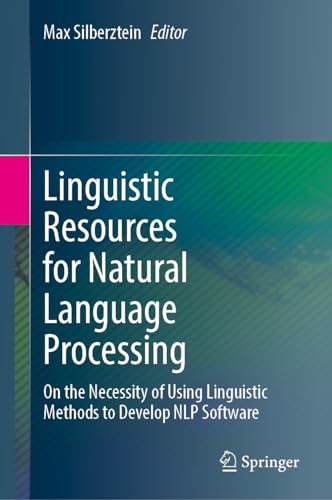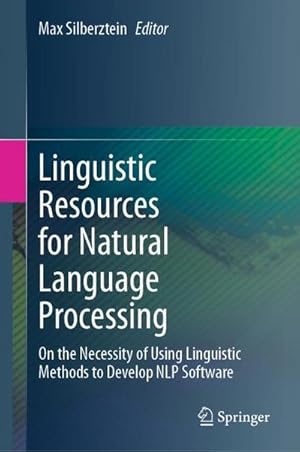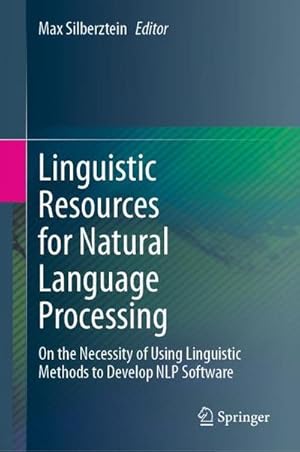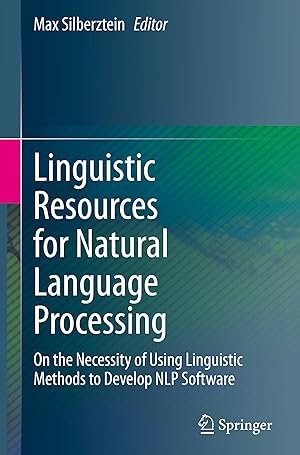linguistic resources natural language (20 résultats)
CommentairesFiltres de recherche
Type d'article
- Tous les types de produits
- Livres (20)
- Magazines & Périodiques (Aucun autre résultat ne correspond à ces critères)
- Bandes dessinées (Aucun autre résultat ne correspond à ces critères)
- Partitions de musique (Aucun autre résultat ne correspond à ces critères)
- Art, Affiches et Gravures (Aucun autre résultat ne correspond à ces critères)
- Photographies (Aucun autre résultat ne correspond à ces critères)
- Cartes (Aucun autre résultat ne correspond à ces critères)
- Manuscrits & Papiers anciens (Aucun autre résultat ne correspond à ces critères)
Etat En savoir plus
- Neuf (18)
- Comme neuf, Très bon ou Bon (2)
- Assez bon ou satisfaisant (Aucun autre résultat ne correspond à ces critères)
- Moyen ou mauvais (Aucun autre résultat ne correspond à ces critères)
- Conformément à la description (Aucun autre résultat ne correspond à ces critères)
Particularités
- Ed. originale (Aucun autre résultat ne correspond à ces critères)
- Signé (Aucun autre résultat ne correspond à ces critères)
- Jaquette (Aucun autre résultat ne correspond à ces critères)
- Avec images (5)
- Sans impressions à la demande (13)
Langue (1)
Prix
- Tous les prix
- Moins de EUR 20 (Aucun autre résultat ne correspond à ces critères)
- EUR 20 à EUR 40 (Aucun autre résultat ne correspond à ces critères)
- Plus de EUR 40
Livraison gratuite
Pays
Evaluation du vendeur
-
Linguistic Resources for Natural Language Processing : On the Necessity of Using Linguistic Methods to Develop Nlp Software
Vendeur : GreatBookPrices, Columbia, MD, Etats-Unis
EUR 152,57
Autre deviseEUR 2,23 expédition vers Etats-UnisQuantité disponible : Plus de 20 disponibles
Ajouter au panierEtat : New.
-
Linguistic Resources for Natural Language Processing: On the Necessity of Using Linguistic Methods to Develop NLP Software
Vendeur : Best Price, Torrance, CA, Etats-Unis
EUR 147,06
Autre deviseEUR 7,59 expédition vers Etats-UnisQuantité disponible : 1 disponible(s)
Ajouter au panierEtat : New. SUPER FAST SHIPPING.
-
Linguistic Resources for Natural Language Processing: On the Necessity of Using Linguistic Methods to Develop NLP Software
Vendeur : Ria Christie Collections, Uxbridge, Royaume-Uni
EUR 147,35
Autre deviseEUR 13,81 expédition depuis Royaume-Uni vers Etats-UnisQuantité disponible : Plus de 20 disponibles
Ajouter au panierEtat : New. In.
-
Linguistic Resources for Natural Language Processing : On the Necessity of Using Linguistic Methods to Develop Nlp Software
Vendeur : GreatBookPricesUK, Woodford Green, Royaume-Uni
EUR 147,34
Autre deviseEUR 17,29 expédition depuis Royaume-Uni vers Etats-UnisQuantité disponible : Plus de 20 disponibles
Ajouter au panierEtat : New.
-
Linguistic Resources for Natural Language Processing : On the Necessity of Using Linguistic Methods to Develop Nlp Software
Vendeur : GreatBookPrices, Columbia, MD, Etats-Unis
EUR 166,20
Autre deviseEUR 2,23 expédition vers Etats-UnisQuantité disponible : Plus de 20 disponibles
Ajouter au panierEtat : As New. Unread book in perfect condition.
-
Linguistic Resources for Natural Language Processing: On the Necessity of Using Linguistic Methods to Develop NLP Software
Vendeur : California Books, Miami, FL, Etats-Unis
EUR 175,94
Autre deviseGratuit expédition vers Etats-UnisQuantité disponible : Plus de 20 disponibles
Ajouter au panierEtat : New.
-
Linguistic Resources for Natural Language Processing : On the Necessity of Using Linguistic Methods to Develop Nlp Software
Vendeur : GreatBookPricesUK, Woodford Green, Royaume-Uni
EUR 167,33
Autre deviseEUR 17,29 expédition depuis Royaume-Uni vers Etats-UnisQuantité disponible : Plus de 20 disponibles
Ajouter au panierEtat : As New. Unread book in perfect condition.
-
Linguistic Resources for Natural Language Processing: On the Necessity of Using Linguistic Methods to Develop NLP Software
Vendeur : Books Puddle, New York, NY, Etats-Unis
EUR 188,27
Autre deviseEUR 3,37 expédition vers Etats-UnisQuantité disponible : 4 disponible(s)
Ajouter au panierEtat : New. 2024th edition NO-PA16APR2015-KAP.
-
Linguistic Resources for Natural Language Processing
Edité par Springer Nature Switzerland, Springer Nature Switzerland Mär 2025, 2025
ISBN 10 : 3031438132 ISBN 13 : 9783031438134
Langue: anglais
Vendeur : buchversandmimpf2000, Emtmannsberg, BAYE, Allemagne
EUR 160,49
Autre deviseEUR 60 expédition depuis Allemagne vers Etats-UnisQuantité disponible : 2 disponible(s)
Ajouter au panierTaschenbuch. Etat : Neu. Neuware -The first part of the volume is dedicated to showing how carefully handcrafted linguistic resources could be successfully used to enhance current NLP software applications. The second part presents two representative cases where data-driven approaches cannot be implemented simply because there is not enough data available for low-resource languages. The third part addresses the problem of how to treat multiword units in NLP software, which is arguably the weakest point of NLP applications today but has a simple and elegant linguistic solution.Springer Verlag GmbH, Tiergartenstr. 17, 69121 Heidelberg 240 pp. Englisch.
-
Linguistic Resources for Natural Language Processing
Edité par Springer Nature Switzerland, Springer International Publishing Mär 2024, 2024
ISBN 10 : 3031438108 ISBN 13 : 9783031438103
Langue: anglais
Vendeur : buchversandmimpf2000, Emtmannsberg, BAYE, Allemagne
EUR 160,49
Autre deviseEUR 60 expédition depuis Allemagne vers Etats-UnisQuantité disponible : 2 disponible(s)
Ajouter au panierBuch. Etat : Neu. Neuware -Empirical ¿ data-driven, neural network-based, probabilistic, and statistical ¿ methods seem to be the modern trend. Recently, OpenAI¿s ChatGPT, Google¿s Bard and Microsoft¿s Sydney chatbots have been garnering a lot of attention for their detailed answers across many knowledge domains. In consequence, most AI researchers are no longer interested in trying to understand what common intelligence is or how intelligent agents construct scenarios to solve various problems. Instead, they now develop systems that extract solutions from massive databases used as cheat sheets. In the same manner, Natural Language Processing (NLP) software that uses training corpora associated with empirical methods are trendy, as most researchers in NLP today use large training corpora, always to the detriment of the development of formalized dictionaries and grammars.Not questioning the intrinsic value of many software applications based on empirical methods, this volume aims at rehabilitating the linguistic approach to NLP. In an introduction, the editor uncovers several limitations and flaws of using training corpora to develop NLP applications, even the simplest ones, such as automatic taggers.The first part of the volume is dedicated to showing how carefully handcrafted linguistic resources could be successfully used to enhance current NLP software applications. The second part presents two representative cases where data-driven approaches cannot be implemented simply because there is not enough data available for low-resource languages. The third part addresses the problem of how to treat multiword units in NLP software, which is arguably the weakest point of NLP applications today but has a simple and elegant linguistic solution.It is the editor's belief that readers interested in Natural Language Processing will appreciate the importance of this volume, both for its questioning of the training corpus-based approaches and for the intrinsic value of the linguistic formalization and the underlying methodology presented.Springer Verlag GmbH, Tiergartenstr. 17, 69121 Heidelberg 240 pp. Englisch.
-
Linguistic Resources for Natural Language Processing : On the Necessity of Using Linguistic Methods to Develop NLP Software
Edité par Springer Nature Switzerland, Springer Nature Switzerland, 2025
ISBN 10 : 3031438132 ISBN 13 : 9783031438134
Langue: anglais
Vendeur : AHA-BUCH GmbH, Einbeck, Allemagne
EUR 160,49
Autre deviseEUR 61,86 expédition depuis Allemagne vers Etats-UnisQuantité disponible : 1 disponible(s)
Ajouter au panierTaschenbuch. Etat : Neu. Druck auf Anfrage Neuware - Printed after ordering - Empirical - data-driven, neural network-based, probabilistic, and statistical - methods seem to be the modern trend. Recently, OpenAI's ChatGPT, Google's Bard and Microsoft's Sydney chatbots have been garnering a lot of attention for their detailed answers across many knowledge domains. In consequence, most AI researchers are no longer interested in trying to understand what common intelligence is or how intelligent agents construct scenarios to solve various problems. Instead, they now develop systems that extract solutions from massive databases used as cheat sheets. In the same manner, Natural Language Processing (NLP) software that uses training corpora associated with empirical methods are trendy, as most researchers in NLP today use large training corpora, always to the detriment of the development of formalized dictionaries and grammars.Not questioning the intrinsic value of many software applications based on empirical methods, this volume aims at rehabilitating the linguistic approach to NLP. In an introduction, the editor uncovers several limitations and flaws of using training corpora to develop NLP applications, even the simplest ones, such as automatic taggers.The first part of the volume is dedicated to showing how carefully handcrafted linguistic resources could be successfully used to enhance current NLP software applications. The second part presents two representative cases where data-driven approaches cannot be implemented simply because there is not enough data available for low-resource languages. The third part addresses the problem of how to treat multiword units in NLP software, which is arguably the weakest point of NLP applications today but has a simple and elegant linguistic solution.It is the editor's belief that readers interested in Natural Language Processing will appreciate the importance of this volume, both for its questioning of the training corpus-based approaches and for the intrinsic value of the linguistic formalization and the underlying methodology presented.
-
Linguistic Resources for Natural Language Processing : On the Necessity of Using Linguistic Methods to Develop NLP Software
Edité par Springer Nature Switzerland, Springer Nature Switzerland, 2024
ISBN 10 : 3031438108 ISBN 13 : 9783031438103
Langue: anglais
Vendeur : AHA-BUCH GmbH, Einbeck, Allemagne
EUR 160,49
Autre deviseEUR 62,65 expédition depuis Allemagne vers Etats-UnisQuantité disponible : 1 disponible(s)
Ajouter au panierBuch. Etat : Neu. Druck auf Anfrage Neuware - Printed after ordering - Empirical - data-driven, neural network-based, probabilistic, and statistical - methods seem to be the modern trend. Recently, OpenAI's ChatGPT, Google's Bard and Microsoft's Sydney chatbots have been garnering a lot of attention for their detailed answers across many knowledge domains. In consequence, most AI researchers are no longer interested in trying to understand what common intelligence is or how intelligent agents construct scenarios to solve various problems. Instead, they now develop systems that extract solutions from massive databases used as cheat sheets. In the same manner, Natural Language Processing (NLP) software that uses training corpora associated with empirical methods are trendy, as most researchers in NLP today use large training corpora, always to the detriment of the development of formalized dictionaries and grammars.Not questioning the intrinsic value of many software applications based on empirical methods, this volume aims at rehabilitating the linguistic approach to NLP. In an introduction, the editor uncovers several limitations and flaws of using training corpora to develop NLP applications, even the simplest ones, such as automatic taggers.The first part of the volume is dedicated to showing how carefully handcrafted linguistic resources could be successfully used to enhance current NLP software applications. The second part presents two representative cases where data-driven approaches cannot be implemented simply because there is not enough data available for low-resource languages. The third part addresses the problem of how to treat multiword units in NLP software, which is arguably the weakest point of NLP applications today but has a simple and elegant linguistic solution.It is the editor's belief that readers interested in Natural Language Processing will appreciate the importance of this volume, both for its questioning of the training corpus-based approaches and for the intrinsic value of the linguistic formalization and the underlying methodology presented.
-
Linguistic Resources for Natural Language Processing: On the Necessity of Using Linguistic Methods to Develop Nlp Software
Edité par Springer-Nature New York Inc, 2024
ISBN 10 : 3031438108 ISBN 13 : 9783031438103
Langue: anglais
Vendeur : Revaluation Books, Exeter, Royaume-Uni
EUR 229,27
Autre deviseEUR 28,81 expédition depuis Royaume-Uni vers Etats-UnisQuantité disponible : 2 disponible(s)
Ajouter au panierHardcover. Etat : Brand New. 239 pages. 9.25x6.10x9.21 inches. In Stock.
-
Linguistic Resources for Natural Language Processing
Edité par Springer Nature Switzerland, Springer Nature Switzerland Mär 2025, 2025
ISBN 10 : 3031438132 ISBN 13 : 9783031438134
Langue: anglais
Vendeur : BuchWeltWeit Ludwig Meier e.K., Bergisch Gladbach, Allemagne
EUR 160,49
Autre deviseEUR 23 expédition depuis Allemagne vers Etats-UnisQuantité disponible : 2 disponible(s)
Ajouter au panierTaschenbuch. Etat : Neu. This item is printed on demand - it takes 3-4 days longer - Neuware -Empirical - data-driven, neural network-based, probabilistic, and statistical - methods seem to be the modern trend. Recently, OpenAI's ChatGPT, Google's Bard and Microsoft's Sydney chatbots have been garnering a lot of attention for their detailed answers across many knowledge domains. In consequence, most AI researchers are no longer interested in trying to understand what common intelligence is or how intelligent agents construct scenarios to solve various problems. Instead, they now develop systems that extract solutions from massive databases used as cheat sheets. In the same manner, Natural Language Processing (NLP) software that uses training corpora associated with empirical methods are trendy, as most researchers in NLP today use large training corpora, always to the detriment of the development of formalized dictionaries and grammars.Not questioning the intrinsic value of many software applications based on empirical methods, this volume aims at rehabilitating the linguistic approach to NLP. In an introduction, the editor uncovers several limitations and flaws of using training corpora to develop NLP applications, even the simplest ones, such as automatic taggers.The first part of the volume is dedicated to showing how carefully handcrafted linguistic resources could be successfully used to enhance current NLP software applications. The second part presents two representative cases where data-driven approaches cannot be implemented simply because there is not enough data available for low-resource languages. The third part addresses the problem of how to treat multiword units in NLP software, which is arguably the weakest point of NLP applications today but has a simple and elegant linguistic solution.It is the editor's belief that readers interested in Natural Language Processing will appreciate the importance of this volume, both for its questioning of the training corpus-based approaches and for the intrinsic value of the linguistic formalization and the underlying methodology presented. 240 pp. Englisch.
-
Linguistic Resources for Natural Language Processing
Edité par Springer Nature Switzerland, Springer Nature Switzerland Mär 2024, 2024
ISBN 10 : 3031438108 ISBN 13 : 9783031438103
Langue: anglais
Vendeur : BuchWeltWeit Ludwig Meier e.K., Bergisch Gladbach, Allemagne
EUR 160,49
Autre deviseEUR 23 expédition depuis Allemagne vers Etats-UnisQuantité disponible : 2 disponible(s)
Ajouter au panierBuch. Etat : Neu. This item is printed on demand - it takes 3-4 days longer - Neuware -Empirical - data-driven, neural network-based, probabilistic, and statistical - methods seem to be the modern trend. Recently, OpenAI's ChatGPT, Google's Bard and Microsoft's Sydney chatbots have been garnering a lot of attention for their detailed answers across many knowledge domains. In consequence, most AI researchers are no longer interested in trying to understand what common intelligence is or how intelligent agents construct scenarios to solve various problems. Instead, they now develop systems that extract solutions from massive databases used as cheat sheets. In the same manner, Natural Language Processing (NLP) software that uses training corpora associated with empirical methods are trendy, as most researchers in NLP today use large training corpora, always to the detriment of the development of formalized dictionaries and grammars.Not questioning the intrinsic value of many software applications based on empirical methods, this volume aims at rehabilitating the linguistic approach to NLP. In an introduction, the editor uncovers several limitations and flaws of using training corpora to develop NLP applications, even the simplest ones, such as automatic taggers.The first part of the volume is dedicated to showing how carefully handcrafted linguistic resources could be successfully used to enhance current NLP software applications. The second part presents two representative cases where data-driven approaches cannot be implemented simply because there is not enough data available for low-resource languages. The third part addresses the problem of how to treat multiword units in NLP software, which is arguably the weakest point of NLP applications today but has a simple and elegant linguistic solution.It is the editor's belief that readers interested in Natural Language Processing will appreciate the importance of this volume, both for its questioning of the training corpus-based approaches and for the intrinsic value of the linguistic formalization and the underlying methodology presented. 240 pp. Englisch.
-
Linguistic Resources for Natural Language Processing
Edité par Springer Nature Switzerland, 2024
ISBN 10 : 3031438108 ISBN 13 : 9783031438103
Langue: anglais
Vendeur : moluna, Greven, Allemagne
EUR 136,16
Autre deviseEUR 48,99 expédition depuis Allemagne vers Etats-UnisQuantité disponible : Plus de 20 disponibles
Ajouter au panierGebunden. Etat : New. Dieser Artikel ist ein Print on Demand Artikel und wird nach Ihrer Bestellung fuer Sie gedruckt. Addresses the topic of multiword units in NLP software and the issue low-resource languagesDiscusses training corpus-based approaches and explains the intrinsic value of linguistic formalizationShows how carefully handcrafted linguistic res.
-
Linguistic Resources for Natural Language Processing: On the Necessity of Using Linguistic Methods to Develop NLP Software
Vendeur : Majestic Books, Hounslow, Royaume-Uni
EUR 197,29
Autre deviseEUR 7,49 expédition depuis Royaume-Uni vers Etats-UnisQuantité disponible : 4 disponible(s)
Ajouter au panierEtat : New. Print on Demand.
-
Linguistic Resources for Natural Language Processing: On the Necessity of Using Linguistic Methods to Develop NLP Software
Vendeur : Biblios, Frankfurt am main, HESSE, Allemagne
EUR 204,36
Autre deviseEUR 9,95 expédition depuis Allemagne vers Etats-UnisQuantité disponible : 4 disponible(s)
Ajouter au panierEtat : New. PRINT ON DEMAND.
-
Linguistic Resources for Natural Language Processing: On the Necessity of Using Linguistic Methods to Develop NLP Software
Vendeur : Majestic Books, Hounslow, Royaume-Uni
EUR 213,25
Autre deviseEUR 7,49 expédition depuis Royaume-Uni vers Etats-UnisQuantité disponible : 4 disponible(s)
Ajouter au panierEtat : New. Print on Demand.
-
Linguistic Resources for Natural Language Processing: On the Necessity of Using Linguistic Methods to Develop NLP Software
Vendeur : Biblios, Frankfurt am main, HESSE, Allemagne
EUR 220,78
Autre deviseEUR 9,95 expédition depuis Allemagne vers Etats-UnisQuantité disponible : 4 disponible(s)
Ajouter au panierEtat : New. PRINT ON DEMAND.








